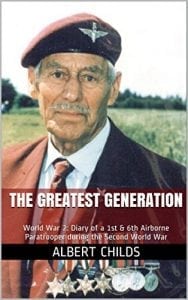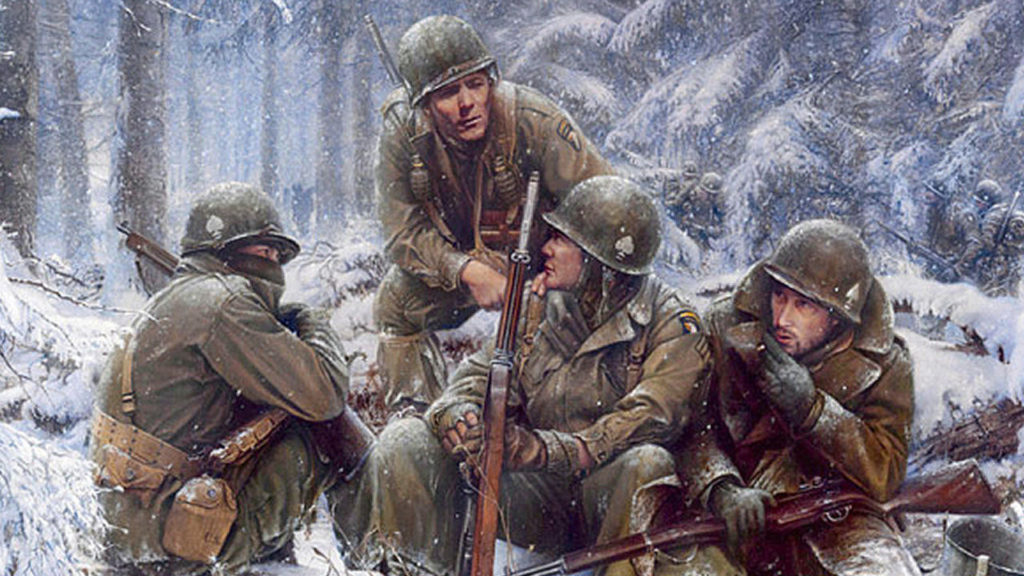Battle of the Bulge (January 2nd 1945)
We went up through La Vallee de La Meuse where the buildings looked very old and historic and I wondered how many of them would still be there when we left. Our particular orders were to take up defensive positions on the northern side of the bridge at Namur and we set up machine-gun posts as soon as we arrived.
Almost immediately other airborne troops began pouring into the town. The cooks got busy, men dug in, sandbags were placed all around and we were ready to play the part of an infantry division.
And as soon as we were ready our orders changed and we were sent south to the town of Marche-en-Famenne to relieve the American 84th Division who had been badly mauled by the leading German troops. We later found out they were the Panzer Lehr, one of Hitler’s elite panzer divisions. Here we took up defensive positions again.
Each night we went out to try and identify the German locations, but nothing moved by day and the fields were covered in thick snow. The bad weather also meant we had no air support and our progress was very slow.
On about 2 January I was instructed to take a section across to the 5th Parachute Brigade area where they were preparing to attack a small village called Bure. German units had been seen there and the 13th Paras were to lead the attack, supported by the 5th Paras.
On the way I was to contact a tank unit belonging to the 23rd Hussars and direct them to the start line. I did this and continued to the outskirts of Bure and discovered it was being bitterly defended by none other than the Panzer Lehr themselves. We had found the bastards.
As I pulled up the 13th Parachute Battalion had already started the attack and we immediately came under heavy artillery and mortar fire. At this point I decided to stay with the tanks as the lead company of the 13th Battalion (A Company) were under heavy fire and their casualties were building up.
I eventually attached myself and my section to their ‘C’ Company who were being held in reserve. We went around the village to the high ground where, after the squadron of tanks of the 23rd Hussars arrived, we went in through the back door.
There was some heavy house to house fighting and I lost four of my section during this attack. ‘A’ Company, on the other side, was practically wiped out after they mistakenly called for artillery fire on their own position.
The losses were very heavy and at one point we were fighting with knives so as not to give our positions away. We were unable to evacuate our casualties and supplies could not be brought in. We were on our own in there and it was horrible.
Although at one point a medic I knew, Sergeant Roberts, arrived in the middle of the battle in his ambulance. He pulled up right next to a panzer tank commander, who happened to speak English and who could not believe his eyes.
But, seeing Roberts was not afraid he allowed him to collect some casualties and then told him to get out of town with a warning not to come back or he would be shot. However, in the end, we managed to clear the village and re-inforce.
Unfortunately it had been reduced to a pile of rubble by the time we did.
The following day the Germans counter attacked but were beaten back each time by artillery and tank fire and with the help of a glider-borne company who had arrived in support. During the battle I lost my truck and my driver, who was sitting in it at the time it was hit.
The Hussars lost nine of their tanks and the 13th Battalion had sixty-eight men and seven of their officers killed. It was intense, but we consolidated our position and the German advance had been halted.
At one moment a three-ton truck from another division drove straight through our forward positions and down towards a railway crossing. The Germans were in the signal box and I watched through my binoculars as they dragged the driver down from his cab.
Obviously somebody else was watching too as a single artillery shell smashed into the box and the Germans scattered up the far hillside followed by a hail of bullets.
I laughed as the lone figure, the driver, ran back up the slope to our positions and collapsed into a trench. It was his lucky day.
The Greatest Generation: Diary of a 1st & 6th Airborne Paratrooper (1940-1950)
The Greatest Generation extracts
Albert Jack AUDIOBOOKS available for download here

The Greatest Generation

